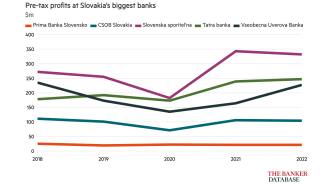The Baltic economies were the canary in the coalmine for the EU, sliding into recession months before Lehman Brothers met its fate. And that recession has been extreme in Latvia's case - by the end of 2009, its gross domestic product (GDP) was 23% smaller than when the decline began in the second quarter of 2008.
The country has slipped out of the headlines recently, largely thanks to an early call to the International Monetary Fund for a €1.7bn loan agreement, signed in December 2008. That deal and a strong policy response from a national unity government formed in March 2009 have stemmed speculative attacks on the Latvian lat's peg to the euro, at least for now. Maris Mancinskis, CEO of Swedbank in Latvia, says that local money market conditions have returned to relative normality, with interbank interest rates on the lat narrowing to about 300 basis points over those on the euro.
But the banking sector is still profoundly troubled. Real estate prices are recovering only slowly, says Zigurds Vaikulis, head of research for Parex Asset Management in Riga. "The average price per square metre has now increased by approximately 7% from its low point in September 2009, but it is still 68% below its peak in July 2007," he says.
Real estate lending, not only mortgages but also loans to construction companies and developers, was a mainstay. "Non-performing loans of 90 days or more overdue reached 16.4% of total Latvian loan portfolios in December 2009, 65% of which were concentrated in sectors related to real estate," says Irena Krumane, chair of the Latvian Financial and Capital Market Commission, which regulates the banking sector.
And this, in turn, is disastrous for bank results. Total losses hit Lt720m (€1.01bn) in 2009, "nearly equivalent to the profits earned by banks during the boom years from 2005 to 2008 combined", says Mr Vaikulis.
House cleaning
A significant proportion of defaulted residential mortgages were to speculative buy-to-let investors, in which case the recovery process focuses on debt collections. By contrast, for those struggling with a mortgage on the property where they reside, the major banks have taken a more conciliatory approach, reducing or postponing monthly interest and principal repayments. Ainars Ozols, CEO of Swedish-owned SEB in Latvia, says that his bank has been prepared to roll as much as 80% of the interest payments into the capital repayment.
Banks have also embraced creative approaches well beyond their traditional remit. In January 2010, Nordea signed an agreement with the Riga Property Managers Association to enable co-operation between the bank and landlords who were owed utility bills or property management fees by tenants in financial difficulties. "The landlord does not want an empty property and it gives them comfort to know that a bank has assessed the tenant's ability to repay and come up with an appropriate solution," says Valdis Siksnis, head of Nordea in Latvia.
His bank has also created a 'school of opportunities' for retail customers who have lost their job, to help the unemployed to navigate the recruitment process or receive training on starting their own business.
"The school has only been running for just over two months, but already it is fully subscribed for 2010. We will monitor success in terms of those returning to work, but perhaps true success will be the number starting their own businesses," says Mr Siksnis.
Other banks are spinning off 'bad bank' vehicles to crystallise write-downs on real estate lending and move to a more stable balance sheet. Swedbank has created the Baltic Restructuring and Recovery Unit for its largest distressed corporate loans. Where this repossesses real estate assets, they are transferred to a special Swedbank-owned property management fund called Ektornet AB.
"The Restructuring and Recovery Unit has already been able to restructure some deals and hand clients back to Swedbank Latvia outside the real estate sector. But most real estate development companies are different because they have lost cash flow and cannot survive unless their owners put new money in," says Mr Mancinskis.
The largest locally owned bank, Parex, is a special case, following its nationalisation in October 2008 in response to a run on deposits. Its CEO, Nils Melngailis, says that he hopes to split off the bad assets during 2010 to create a more predictable balance sheet as a key step to reprivatising the bank.
"Depending on how large the restructuring vehicle is, it will most likely be funded by some combination of the government and the bank itself. I would also not rule out a third-party investor coming in, as there is a great deal of demand for this type of distressed real estate asset - billions of euros from private equity and pension funds are looking for these opportunities," says Mr Melngailis.

Vladimir Antonov, chairman of Krajbanka
Lending still subdued
Parex aside, other Latvian banks have managed to cover their losses and the Nordic banks in the country agreed with multilateral institutions at a September 2009 meeting in Stockholm to retain the capitalisation of their Latvian subsidiaries.
"The decrease in funding coming from parent banks to their subsidiaries is compensated by parent banks' capital injections. Since the beginning of 2009, the capital of subsidiaries has been increased by more than Lt550m," says Ms Krumane. However, she acknowledges that net lending is likely to continue decreasing in 2010 after shrinking by 7% in 2009 because conditions for new loans will reflect "the reality of the current situation".
Mr Ozols says that SEB actually wrote Lt360m of new business in 2009, although this was outweighed by losses and repayments. "Exporters, companies in the retail trade sector and small and medium-sized enterprises [SMEs] providing different local services are in a better position to seek new lending," says Mr Ozols.
At Swedbank, Mr Mancinskis believes that "certain less leveraged, more conservative companies can attract new money," even in the construction sector. "We are readier to support new activities for existing clients, but not yet ready to make investments in new clients," he says.
To help plug the gap in new funding, the government resolved in November 2009 to transform 100% state-owned Hipoteku Bank into a fully fledged development bank for Latvia. "This is a good sign for co-operation with commercial banks, because we were to some extent competing with them before," says Juris Cebulis, a former economy ministry official who runs the bank's SME development lending programme, Altum.
Altum is now targeting start-ups that will struggle to win funding from banks at this time, or fast-growing companies whose relationship lenders have reached their exposure limit for the client. In response to the crisis, it has also begun to make loans to larger companies for activities specifically designed to increase competitiveness.
"Demand for our support has increased because companies need more working capital as suppliers tighten their credit terms and because collateral values on their existing loans have fallen heavily so they cannot borrow as much from commercial lenders," says Mr Cebulis.
More equal market
While bankers and their clients alike are keen to see conditions improve, there is also a sense of relief that the ill-judged lending in the boom years is unlikely to be repeated. The consensus is that Latvian borrowers will need to rely on less aggressive financing structures in the future and find more equity of their own to put in.
"Developing such a large financial sector was an essential mistake for such a small country as Latvia, due to unreasonable speculative transactions and megalomania to become the second 'Swiss financial centre'," says Ms Krumane.
According to Mr Siksnis, "liquidity for well-structured deals has come back, but competition through the most reckless offers of some years ago is over". Nordea was distinctive among the Nordic banks for operating credit policies that were as conservative in Latvia as in its home market, even during the period of rapid loan growth. As a result, its bad loan ratio is about half the national average.
Other banks took evasive action as the economy began to stutter. SEB surrendered about nine percentage points of market share by tightening its lending criteria, but according to Mr Ozols, "no-one could escape such a tsunami-like downturn - we were working on assumptions of a 5% or 6% GDP contraction." SEB cut costs by about 10% in 2009, with further belt tightening expected in 2010. Seven of its 60 branches in more peripheral areas were closed and others reallocated.
Consequently, smaller banks see an opportunity to compete on more equal terms with the larger Scandinavian players. Russian businessman Vladimir Antonov is chairman of Krajbanka, of which he directly owns a 32% stake, as well as holding 53% indirectly through Lithuanian Snoras Bank. He says the banks he owns have already picked up several thousand accounts in the retail and SME segments from Scandinavian competitors, helped by a 350-branch network across the Baltics that is able to offer services and deeper knowledge in localities now neglected by the largest banks.
"Krajbanka will remain a pure retail and SME bank for now. This is because the SME sector has tended to be much more stable during this crisis and because the Scandinavian banks were able to provide very cheap resources to the large corporations that we could not compete with," says Mr Antonov. Even the larger companies are not beyond the group's reach now, however, with a particular focus on the transport sector - Air Baltic has become a client.












